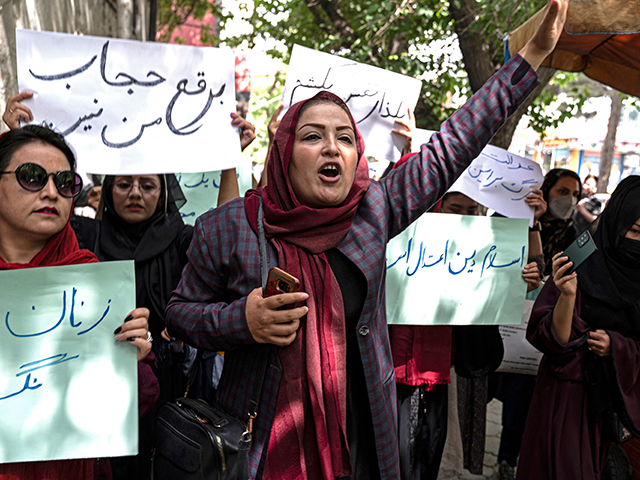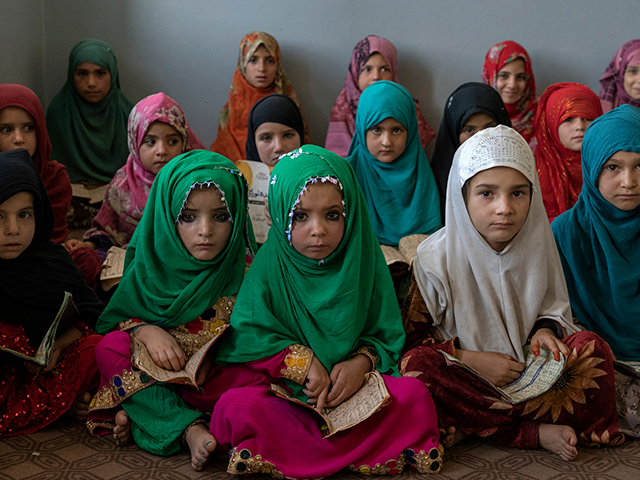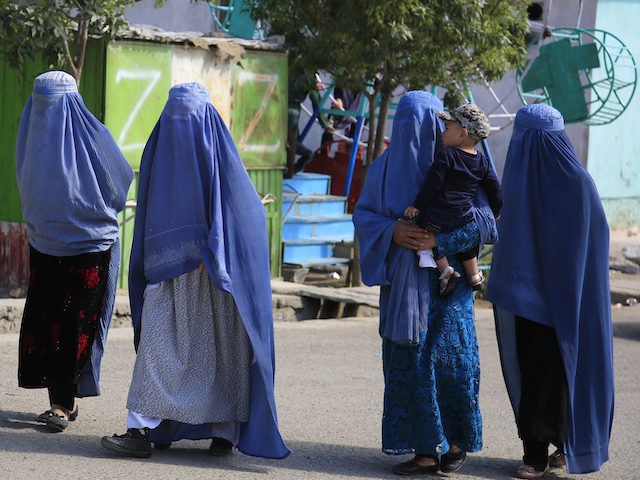Taliban Ministry of Vice and Virtue spokesman Molvi Mohammad Sadiq Akif explained on Thursday that his extremist regime forces women to cover their faces because the “value” of a woman “decreases” when men look at her.
“It is very bad to see women in some areas, and our scholars also agree that women’s faces should be hidden,” Akif told the Associated Press. By “see women in some areas,” he meant seeing women walking around without mandatory face coverings in crowded cities.
“It’s not that her face will be harmed or damaged. A woman has her own value and that value decreases by men looking at her. Allah gives respect to females in hijab and there is value in this,” he said.
Akif claimed Afghans are delighted to have the Taliban’s severe interpretation of Islamic law imposed on them again. Women, in particular, are supposedly happy that the Taliban is forcing them to cover up so men will not leer at them. He then admitted his regime maintains an extensive network of secret police and informants to ensure everyone is experiencing the full measure of mandatory happiness with Taliban rule.

Members of Afghanistan’s Powerful Women Movement, take part in a protest in Kabul on May 10, 2022. About a dozen women chanting “burqa is not my hijab” protested in the Afghan capital on May 10 against the Taliban’s order for women to cover fully in public, including their faces. (WAKIL KOHSAR/AFP via Getty Images)
“Our ombudsmen walk in markets, public places, universities, schools, madrasas and mosques. They visit all these places and watch people. They also speak with them and educate them. We monitor them and people also cooperate with and inform us,” he said.
Asked to justify the Taliban’s cruel ban on women going to public parks and gymnasiums, Akif clarified that women are only forbidden to enter parks if men happen to be there.
“You can go to the park, but only if there are no men there. If there are men, then sharia does not allow it. We don’t say that a woman can’t do sports, she can’t go to the park or she can’t run. She can do all these things, but not in the same way as some women want, to be semi-naked and among men,” he said.
Critics of the Taliban are unlikely to be satisfied with this apologia for brutish misogyny. On Wednesday, U.N. Special Envoy for Global Education Gordon Brown proposed prosecuting Taliban leaders for crimes against humanity at the International Criminal Court (ICC).
Brown forwarded a legal opinion to the ICC arguing that the Taliban’s ban on women receiving an education should be prosecuted as institutionalized “gender discrimination.” He also suggested convincing Muslim countries to send a delegation of Islamic scholars to convince the Taliban that banning women from education and employment has “no basis in the Quran or Islamic religion.”
Brown thought there was a “split within the regime” between Taliban ministers in Kabul who might be willing to restore women’s education and fire-breathing “clerics in Kandahar” who demanded the ban. This optimistic analysis would seem to be contradicted by the Taliban minister explaining on Thursday that keeping women wrapped in cloth preserves their value.

Afghan girls read the Quran in the Noor Mosque outside the city of Kabul, Afghanistan, Wednesday, Aug 3, 2022. (AP Photo/Ebrahim Noroozi)
Taliban spokesman Zabihullah Mujahid immediately dismissed Brown’s concerns as “political propaganda” and insisted the ban on women in schools will remain in effect, although he conceded “the Islamic Emirate of Afghanistan does not deny there are issues in terms of rights which need reform.”
The Taliban consolidated its grip on power on Wednesday by banning all other political parties from Afghanistan, ruling that they, too, are violations of Islamic law.
“There is no Sharia basis for political parties to operate in the country. They do not serve the national interest, nor does the nation appreciate them,” said Taliban justice minister Abdul Hakim Sharaee.
Afghanistan had about 70 political parties before President Joe Biden’s disastrous withdrawal swept the Taliban into power two years ago. Much of the leadership of those parties fled the country after the fall of Kabul in August 2021.
“The political party ban is expected to complicate reconciliation efforts among Afghans seeking to initiate a dialogue between various political factions. The international community has supported such a dialogue with the aim of eventually forming a broad-based government in the war-torn nation,” Radio Free Europe (RFE) said on Thursday.
RFE inadvertently touched on one of the major reasons why the Taliban imposed the ban: The last thing the Islamic Emirate of Afghanistan wants is an internationally-supported dialogue between various political factions that might result in a national reconciliation that displaces absolute Taliban rule in favor of a broad-based government.
RFE implicitly accused the Taliban of hypocrisy for banning political parties because the Taliban itself is essentially an offshoot of an Islamist party in Pakistan, which then flourished as an insurgent student movement in Afghanistan in the 1990s. “Hypocrisy” might not be the best term for the Taliban deciding to eliminate political parties so no fresh insurgent movement might grow to someday challenge authoritarian Taliban rule.

COMMENTS
Please let us know if you're having issues with commenting.